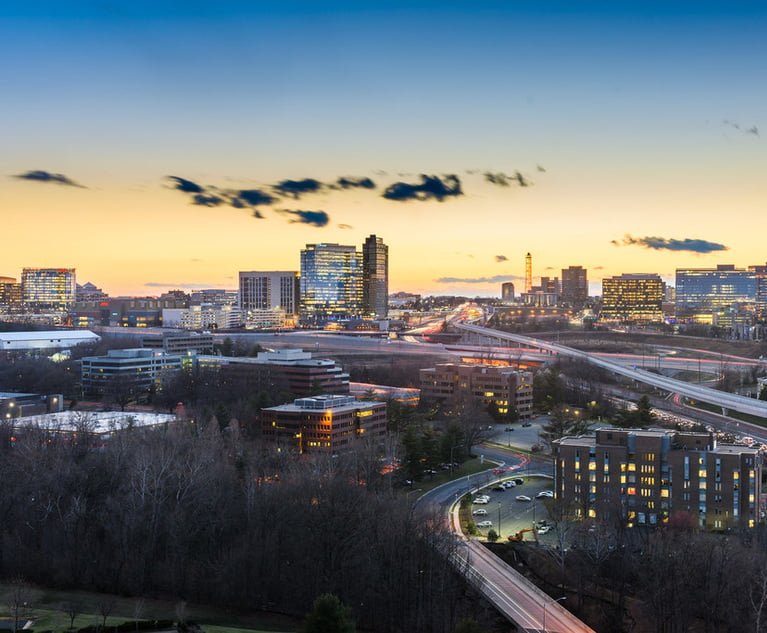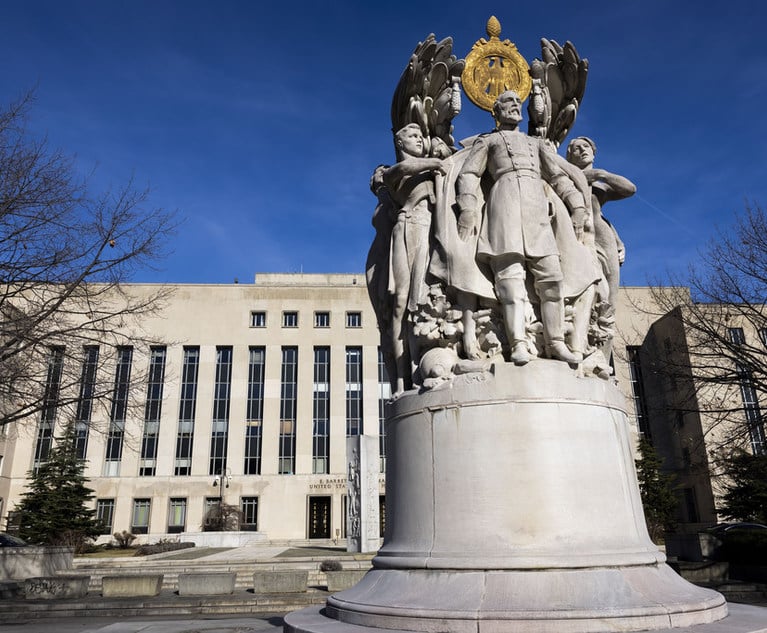Construction of Virginia Natural Gas Pipeline Halted by 4th Circuit
In an action brought by environmental groups, a federal appeals court has blocked construction of a proposed stretch of natural gas pipeline that would cross the scenic Blue Ridge Parkway in Virginia, saying federal regulators failed to abide by appropriate permitting procedures.
August 07, 2018 at 06:01 PM
3 minute read
 Shutterstock has blocked construction
Shutterstock has blocked construction Gregory, in the Aug. 6 decision, said construction of the project cannot proceed without a valid and enforceable permit from FWS for the “incidental taking” of five threatened or endangered species in the pipeline's path.
Without valid permits from the two federal agencies, the ACP, “should it continue to proceed with construction,” would violate the terms of the project's approval from the Federal Energy Regulatory Commission, Gregory said.
Environmental organizations that brought the two cases covered by the opinion have called on the FERC to halt construction of the pipeline along its entire length through West Virginia, Virginia and North Carolina.
The panel's ruling on the “incidental taking” of threatened or endangered species expands on its decision in May to vacate the FWS permit for construction that would harm habitats for the clubshell mussel, the rusty-patched bumblebee, the Madison Cave isopod, the Indiana bat and the Northern long-eared bat.
Gregory said the NPS also failed to show that it had the authority to grant a right-of-way through the parkway area. The pipeline would require a 125-foot right-of-way, which opponents argue would spoil scenic views.
A separate lawsuit is challenging NPS approval of the project's plan to drill through the Blue Ridge Mountains beneath the Appalachian Trail without first obtaining approval from Congress.
“What is clear from today, there is a 600-mile pipeline with a hole in the middle,” said DJ Gerken, an attorney for the Southern Environmental Law Center in Asheville, North Carolina, who argued the two cases for Defenders of Wildlife, the Sierra Club and the Virginia Wilderness Committee.
“What they should be doing right now is rethinking the whole project,” Gerken said of the ACP, led by Dominion Energy. “They should at least be rethinking a new route.”
Dominion took a completely different view of the panel's decision and expressed confidence that the two agencies can quickly reinstate the permits to satisfy the court's concerns in both cases.
“We believe the court's concerns can be promptly addressed through additional review by the agencies without causing unnecessary delay to the project,” spokesman Aaron Ruby said in a statement on Monday. “In the meantime, we will continue making progress with construction in West Virginia and North Carolina.”
This content has been archived. It is available through our partners, LexisNexis® and Bloomberg Law.
To view this content, please continue to their sites.
Not a Lexis Subscriber?
Subscribe Now
Not a Bloomberg Law Subscriber?
Subscribe Now
NOT FOR REPRINT
© 2025 ALM Global, LLC, All Rights Reserved. Request academic re-use from www.copyright.com. All other uses, submit a request to [email protected]. For more information visit Asset & Logo Licensing.
You Might Like
View All
Northern Virginia Law Firms Target 'Niche' Practices Amid Rising Market Competition
4 minute read
DC Circuit Rules Builders Risk Insurance Mandates Coverage for $1.5M Loss
2 minute read

Federal Lawsuits Target Huawei, Lafarge, Alleging They've Aided Terrorist Organizations
Trending Stories
- 1ACC CLO Survey Waves Warning Flags for Boards
- 2States Accuse Trump of Thwarting Court's Funding Restoration Order
- 3Microsoft Becomes Latest Tech Company to Face Claims of Stealing Marketing Commissions From Influencers
- 4Coral Gables Attorney Busted for Stalking Lawyer
- 5Trump's DOJ Delays Releasing Jan. 6 FBI Agents List Under Consent Order
Who Got The Work
J. Brugh Lower of Gibbons has entered an appearance for industrial equipment supplier Devco Corporation in a pending trademark infringement lawsuit. The suit, accusing the defendant of selling knock-off Graco products, was filed Dec. 18 in New Jersey District Court by Rivkin Radler on behalf of Graco Inc. and Graco Minnesota. The case, assigned to U.S. District Judge Zahid N. Quraishi, is 3:24-cv-11294, Graco Inc. et al v. Devco Corporation.
Who Got The Work
Rebecca Maller-Stein and Kent A. Yalowitz of Arnold & Porter Kaye Scholer have entered their appearances for Hanaco Venture Capital and its executives, Lior Prosor and David Frankel, in a pending securities lawsuit. The action, filed on Dec. 24 in New York Southern District Court by Zell, Aron & Co. on behalf of Goldeneye Advisors, accuses the defendants of negligently and fraudulently managing the plaintiff's $1 million investment. The case, assigned to U.S. District Judge Vernon S. Broderick, is 1:24-cv-09918, Goldeneye Advisors, LLC v. Hanaco Venture Capital, Ltd. et al.
Who Got The Work
Attorneys from A&O Shearman has stepped in as defense counsel for Toronto-Dominion Bank and other defendants in a pending securities class action. The suit, filed Dec. 11 in New York Southern District Court by Bleichmar Fonti & Auld, accuses the defendants of concealing the bank's 'pervasive' deficiencies in regards to its compliance with the Bank Secrecy Act and the quality of its anti-money laundering controls. The case, assigned to U.S. District Judge Arun Subramanian, is 1:24-cv-09445, Gonzalez v. The Toronto-Dominion Bank et al.
Who Got The Work
Crown Castle International, a Pennsylvania company providing shared communications infrastructure, has turned to Luke D. Wolf of Gordon Rees Scully Mansukhani to fend off a pending breach-of-contract lawsuit. The court action, filed Nov. 25 in Michigan Eastern District Court by Hooper Hathaway PC on behalf of The Town Residences LLC, accuses Crown Castle of failing to transfer approximately $30,000 in utility payments from T-Mobile in breach of a roof-top lease and assignment agreement. The case, assigned to U.S. District Judge Susan K. Declercq, is 2:24-cv-13131, The Town Residences LLC v. T-Mobile US, Inc. et al.
Who Got The Work
Wilfred P. Coronato and Daniel M. Schwartz of McCarter & English have stepped in as defense counsel to Electrolux Home Products Inc. in a pending product liability lawsuit. The court action, filed Nov. 26 in New York Eastern District Court by Poulos Lopiccolo PC and Nagel Rice LLP on behalf of David Stern, alleges that the defendant's refrigerators’ drawers and shelving repeatedly break and fall apart within months after purchase. The case, assigned to U.S. District Judge Joan M. Azrack, is 2:24-cv-08204, Stern v. Electrolux Home Products, Inc.
Featured Firms
Law Offices of Gary Martin Hays & Associates, P.C.
(470) 294-1674
Law Offices of Mark E. Salomone
(857) 444-6468
Smith & Hassler
(713) 739-1250








